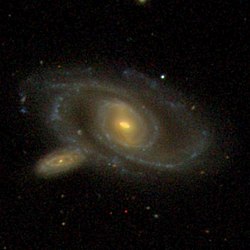| NGC 3861 | |
|---|---|
 SDSS image of NGC 3861 and MCG +03-30-094 (galaxy at the lower left). | |
| Observation data (J2000 epoch) | |
| Constellation | Leo |
| Right ascension | 11h 45m 03.9s[1] |
| Declination | 19° 58′ 25″[1] |
| Redshift | 0.016982[1] |
| Heliocentric radial velocity | 5091 km/s[1] |
| Distance | 310 Mly (95.1 Mpc)[1] |
| Group or cluster | Leo Cluster |
| Apparent magnitude (V) | 13.7[1] |
| Characteristics | |
| Type | (R')SAB(r)b[1] |
| Size | ~224,000 ly (68.8 kpc) (estimated)[1] |
| Apparent size (V) | 2.53 x 0.99[1] |
| Other designations | |
| CGCG 97-129, IRAS 11424+2015, KCPG 299A, MCG 3-30-93, PGC 36604, UGC 6724[1] | |
NGC 3861 is a large[2] barred spiral galaxy[3][4] with a ring-like structure[3] located about 310 million light-years away[5] in the constellation Leo.[6] It was discovered by astronomer John Herschel on March 23, 1827.[7] NGC 3861 is a member of the Leo Cluster and has a normal amount of neutral hydrogen (H I) and ionised hydrogen (H II).[2]
NGC 3861 is a low luminosity type II Seyfert galaxy.[8] However, it is also classified as a LINER galaxy.[9][10]
On March 7, 2014, a type Ia supernova designated as SN 2014aa was discovered in NGC 3861.[11][12][13]
- ^ a b c d e f g h i j "NASA/IPAC Extragalactic Database". Results for NGC 3861. Retrieved 2018-07-27.
- ^ a b Scott, T. C.; Usero, A.; Brinks, E.; Boselli, A.; Cortese, L.; Bravo-Alfaro, H. (2012-12-03). "CO in late-type galaxies within the central region of Abell 1367". Monthly Notices of the Royal Astronomical Society. 429 (1): 221–241. arXiv:1211.0523. doi:10.1093/mnras/sts328. ISSN 1365-2966. S2CID 2578309.
- ^ a b "HyperLeda -object description". leda.univ-lyon1.fr. Retrieved 2018-07-28.
- ^ "Your NED Search Results". ned.ipac.caltech.edu. Retrieved 2018-07-28.
- ^ "NED Query Results for NGC 3861". ned.ipac.caltech.edu. Retrieved 2018-07-28.
- ^ "Revised NGC Data for NGC 3861". spider.seds.org. Retrieved 2018-07-28.
- ^ "New General Catalog Objects: NGC 3850 - 3899". cseligman.com. Retrieved 2018-07-17.
- ^ Sun, M.; Murray, S. S. (2002). "Chandra View of the Dynamically Young Cluster of Galaxies A1367. II. Point Sources". The Astrophysical Journal. 577 (1): 139–149. arXiv:astro-ph/0202431. Bibcode:2002ApJ...577..139S. doi:10.1086/342156. ISSN 0004-637X. S2CID 119421982.
- ^ Terashima, Yuichi; Hirata, Yoshitaka; Awaki, Hisamitsu; Oyabu, Shinki; Gandhi, Poshak; Toba, Yoshiki; Hideo Matsuhara (2015). "A New Sample of Obscured AGNs Selected from the XMM-Newton and AKARI Surveys". The Astrophysical Journal. 814 (1): 11. arXiv:1511.00431. Bibcode:2015ApJ...814...11T. doi:10.1088/0004-637X/814/1/11. ISSN 0004-637X. S2CID 118472770.
- ^ "NGC 3861". Retrieved 2018-07-28.
- ^ "Bright Supernovae - 2014". rochesterastronomy.org. Retrieved 2018-07-28.
- ^ "SN 2014aa | Transient Name Server". wis-tns.weizmann.ac.il. Retrieved 2018-07-28.
- ^ "2014aa - The Open Supernova Catalog". sne.space. Archived from the original on 2018-07-28. Retrieved 2018-07-28.